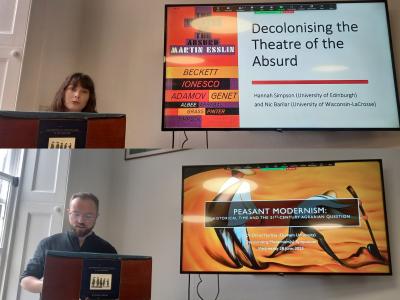
This symposium on June 28, 2023 was co-organised by Dr Sourit Bhattacharya (Lecturer, English Literature, The University of Edinburgh) and Dr Arka Chattopadhyay (Charles Wallace India Trust Fellow, IASH and Assistant Professor, IIT Gandhinagar), with contributions from Dr Daniel Hartley (Durham University), Dr Hannah Simpson (University of Edinburgh), Dr Norman Ajari (University of Edinburgh), Dr Priyanka Tripathi (IIT Patna), Dr Shalini Sengupta (University of Vienna) and Aryanil Mukherjee (poet and engineering mathematician, Cincinnati, USA). The event was meant to generate a dialogue among different approaches to decoloniality in the field of global modernist studies. The hybrid symposium had three panels (two offline and one online) running from 10am to 5pm. Each panel comprised two 25 min papers, leaving around 25 mins for Q&A. The two organisers initiated the discussion by engaging with what the term ‘modernism’ in the singular and ‘modernisms’ in the plural might mean across national, linguistic and cultural borders. They positioned the decolonising process in a complex interaction with colonial intellectual norms and traditions. In line with the symposium’s core idea of decolonising modernisms across the world, the papers dealt with multiple identity categories like class, caste, gender and race to diversify modernist manifestations in literature and looked at the idea of the publishing platform in building transnational modernist networks.
In the first panel, Dr Hartley presented a theoretical paper on the category and functionality of peasants in modernism. Often mistakenly considered a pre-modernist social identity from agrarian economy, peasants had more than a vital role to play in modernism, as the paper showed with a focus on Fredric Jameson’s ideas. Hartley drew attention to the complexities of time and relocated the peasants as resisting subjects in modernity and modernism. If his paper attempted to decolonise modernisms by politicising it along insurrectionist lines, the second paper delivered by Dr Hannah Simpson historicised and politicised the so-called ‘absurdist’ plays of Beckett, Genet and Adamov in an attempt to take away from Martin Esslin’s depoliticising label for these starkly different playwrights. She linked their plays with the anti-colonial resistance, happening in France at the time (1960s), be it the Algerian war of independence or the May 1968 movement. The paper made an appeal to decolonize the canon of modernist theatre by demonstrating how decoloniality itself can be read as a theme into the canon.
The second panel tackled two important identity categories vis-à-vis modernisms across the world: race and caste. Dr Norman Ajari’s paper looked at the paradoxes of race in George S. Schuyler’s novel Black Empire with a focus on Afrofuturism and the antinomies of the Black radical tradition. His paper explored the problematic politics of the black writer who doesn’t take up the normativized progressive position. The implications of reactionary politics and its ironies were further developed in Dr Priyanka Tripathi’s paper that turned our gaze to Dalit Indian women’s writings in English and traced the relation between hegemonic masculinity and caste. Her readings broached the question of Dalit masculinity to show how gender and caste categories interacted in a dynamic way. Utilizing the ‘multidimensionality’ model, she underlined the antinomies of modernity in the Indian context.
The third and final panel consisted of two online talks. In the first, Dr Shalini Sengupta further complicated the point about gender in modernisms by bringing in diasporic Indian women’s writing. She deepened the diasporic context to highlight their engagement with form, language and meaning in an experimental quest that approached life beyond the human in writers like Sumana Roy and Bhanu Kapil. The second paper delivered by Aryanil Mukherjee, a practising poet and the editor of Kaurab Online, the first web-magazine in any South-Asian language, presented an overview of the literary networks that led to the
transnational literary practice of the magazine, the kind of writers it nurtured and the poetics of construction in what the group called ‘circumcontentive’ poetry. The paper was accompanied by a digital exhibition of the magazine that took us through the highlights of its journey by showing different issues, features, covers and selected content.
As the closing remarks of the organisers underscored again, the symposium worked well as a forum to discuss the multifarious habitations of modernism in different geographies to signal how it multiplies itself according to race, class, caste, gender and the publishing avenues. The symposium workshopped manifold ideas on modernisms and decoloniality and addressed the urgent need to plasticize modernisms and observe how literary traditions of modernism are dialectically reinvented in transnational and decolonial contexts. The next step would be to think of publishing the papers in a journal special issue and the organisers are working on that. They see this event as part of a larger process of building research networks across the world where more such deliberations and dialogues can take place in future. An online reading group, a blog and the eventual formation of a decolonial modernism research network are some prospective avenues to look out for.
The organisers are grateful to the Susan Manning Workshop Fund at IASH, to Dr Ben Fletcher-Watson, Pauline Clark and Lauren Galligan for technical and logistical assistance, and to the IASH Director, Professor Lesley McAra. The programme of the symposium can be found here.
